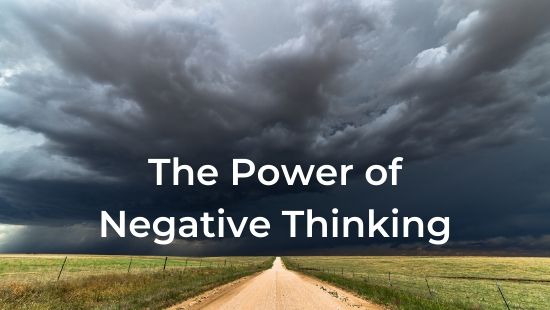If you’re like me, you might be battling a lot of negative thoughts lately. Do you feel like you shouldn’t be? It’s understandable. The neverending messaging of the “power of positive thinking” makes it seem like if we are feeling negative, we are doing it wrong.
As Oliver Burkeman, a positive psychology critic and columnist at The Guardian, argues:
“It is our constant quest to eliminate or to ignore the negative—insecurity, uncertainty, failure, sadness—that causes us to feel so insecure, anxious, uncertain, or unhappy in the first place.”
I’d have to agree with Oliver.
I’m not suggesting we wallow in negative thoughts that don’t serve us.
Instead, I’d like to offer that we stop resisting the negativity bias in our brains and start leveraging it.
Negativity Bias is Hardwired
Our human brains are hardwired for negativity. A crucial factor in our evolution and survival has been our ability to dodge danger. We adapted by learning more quickly from bad experiences and more slowly from good.
Dr. Rick Hanson, psychologist and senior fellow of the Greater Good Science Center at UC Berkeley, writes in detail about this in his book, Hardwiring Happiness: The New Brain Science of Contentment, Calm, and Confidence
So why fight our human nature? Why not make it work for us?
Do a Debbie Downer Download
Let’s not judge our thoughts or try to hold them down like a beachball we’re trying to keep underwater. Instead, “bring it on!” Bring on all the negative thoughts. All – of – them! Try writing down 50 of the “negative” thoughts you are having about a situation, project, another person, or about yourself.
By negative thoughts, I mean thoughts you do not want to have because they are not serving you. Don’t edit yourself. No one is watching. Some of your ideas might seem outrageously silly, but it doesn’t matter. Right them down anyway. The more, the better.
I suggest challenging yourself to write 50 things so you can unearth the deeper thoughts that might not make their way to the surface otherwise. If you get stuck, keep asking, “what else?”
Shed Some Light
Now that you’ve got your download shed some light on it. Separate the fact from fiction, and the helpful from the destructive. Take your list of 50 thoughts and divide them into two groups: 1) Primitive Brain Doing Its Thing and 2) Genuine Concerns to Consider.
Primitive Brain Doing Its Thing
Some thoughts will be extreme overreactions to the negative. These are the catastrophizing views and the, “I need to stay inside the cave, so I don’t get eaten by the tiger” kind of thinking.
For each of these thoughts, take a cue from the Dalai Lama and develop an opposing, useful idea that will serve you better. What do you want to think instead of this thought? What would be more empowering? Write that thought down. These are thoughts you’ll want to practice until they become beliefs.
Genuine Concerns to Consider
These negative thoughts come from our executive functioning that occurs in our prefrontal cortex, and they deserve respect. The positive power of negative thinking at work! These aren’t thoughts you want to avoid, but instead, meet them head-on. Julie Normen wrote an entire book on you mind find interesting, The Positive Power of Negative Thinking.
For each of these thoughts, answer these two questions 1) what can you do to mitigate your risk, and 2) how would you recover if this bad thing happened despite your best mitigation efforts?
Pro Tip: If you struggle to come up with how you would recover, it helps to remove “you” from the perspective. Instead, try asking, “If someone else overcame this challenge, how might they have done it?”

Do It As a Team
This Debbie Downer Download/Shedding Light exercise is great to do as a team anytime the team is facing challenges. The Project Pre-mortem process can anticipate risks, but it doesn’t typically address the collective primitive thoughts that will ultimately hinder the team. Developing opposing, positive thoughts to counter these destructive thoughts as a team can be a powerful exercise that will strengthen the team.
Holding space for negative thoughts, refraining from judgment, and expecting those negative thoughts to be along for the ride can be enlightening. Instead of fighting or judging the negativity bias of our human brains, we can leverage it by downloading our negative thoughts and shedding light on them to use them to our advantage.
Stay safe and be well.


